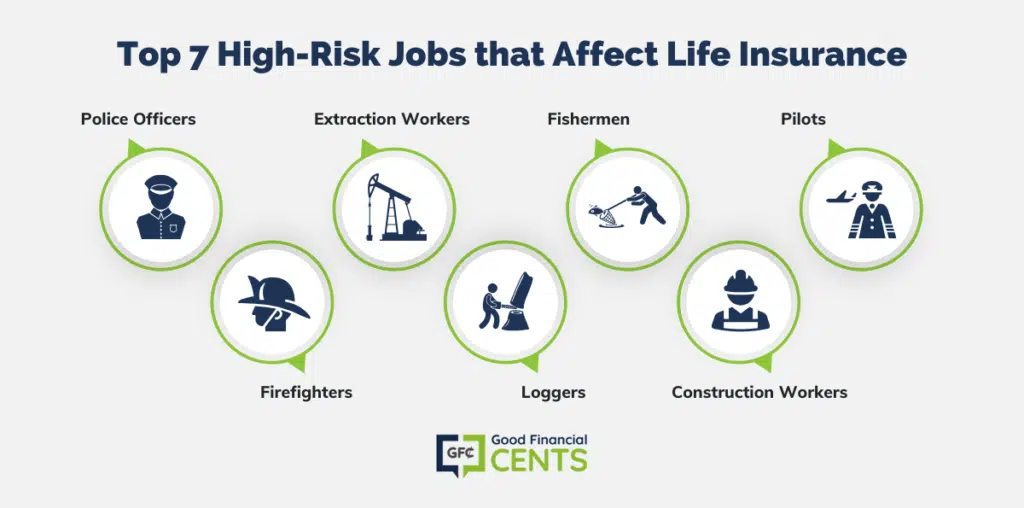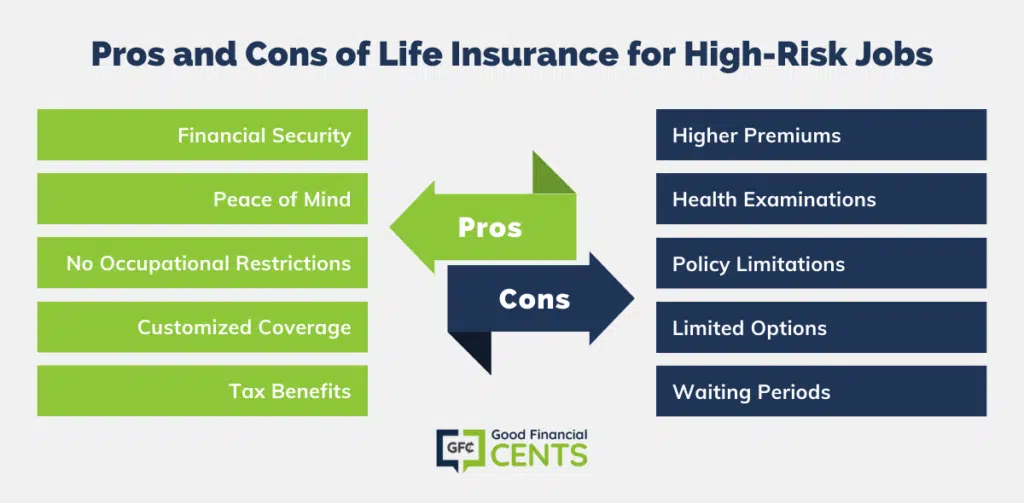Your job impacts your everyday life in a profound way. If you work in a dangerous field, your job impacts your life even more.
When your job puts you at a heightened risk of serious injury or untimely death, it impacts your access to life insurance.
In this post, we’ll cover the most dangerous jobs that affect life insurance premiums and share advice for getting coverage with a high-risk job.
Table of Contents
7 Most Dangerous Jobs
How Life Insurance Companies View High-Risk Jobs
When you apply for life insurance, you’ll answer a lot of questions: questions about your health, age, family health history, hobbies, and career.
These questions about your genetics, lifestyle, and profession all share one agenda: assessing risk.
Life is fragile, so insurance companies automatically take on a risk when they offer coverage to applicants.
Whether you have heart disease or like to get your heart racing with a high-risk hobby, you can expect your life insurance company to take notice.
Top 7 High-Risk Jobs that Affect Life Insurance
Here are our top jobs that can affect life insurance.
Police Officers
Police officers lay their lives on the line every day to protect society, walking into perilous situations regularly.
Based on those factors and statistics, members of the police force pose a higher risk to life insurance companies than many other types of professionals.
How much your police work impacts life insurance is dependent on the nature of your job.
If you’re a standard municipal officer, for instance, you may see little to no effect. If, however, you are a state trooper or work for a sheriff’s office, you’re more likely to be rated high risk.
If you work on a bomb squad or other highly hazardous unit, you can expect to be considered high risk.
Firefighters
Firemen and women face blazing perils every day. Fortunately, firefighters are well-trained and approach burning buildings tactically, with safety gear and precautions in place.
For those reasons, municipal firefighters who fight standard fires in cities and rural communities are unlikely to be labeled high risk.
Those who work in perilous places, though, like oil rigs or mines, are considered to be high-risk applicants.
Extraction Workers
Firefighters aren’t the only ones on oil rigs who are considered to be high-risk.
You may hear the term miscellaneous extraction worker floating around in the life insurance world.
This name encompasses workers on oil rigs, mines, platforms, construction demo cleanup, and other industries that involve extracting or cleaning up natural resources.
If you specialize in one of these fields and work around heavy-duty hazardous equipment, finding life insurance will be challenging, but not impossible.
Loggers
Logging is often deemed the nation’s most dangerous job. The logging industry exposes workers to a number of safety hazards, like falling out of trees.
Logging is even more dangerous because many times, there isn’t a hospital in sight when loggers are injured, making a risky situation even worse.
Along those lines, in some regions deemed to be extra hazardous, ranchers and farmers are considered to be high-risk applicants.
Fishermen
Another profession in the great outdoors that sets off red flags for life insurance companies is offshore fishing. Turn on Deadliest Catch and you’ll see why.
If you’re an offshore commercial fisherman, your life insurance will be impacted, whether you’re on a small private boat or a potentially large commercial boat.
In some instances, individuals who work in fish farming or processing can be flagged as well.
An agent can help you determine whether or not your fishing job will be classified as high-risk and what effects it will have on your policy options.
Construction Workers
Construction workers are often labeled as high-risk applicants for life insurance.
If you work on a construction site, you could fall, get injured working with equipment, and be exposed to a higher risk of fire or electrocution.
How much your job in the construction field impacts your life insurance will depend on a number of factors:
- Your Daily Job Responsibilities
- The Machines You Work With
- The Settings in Which You Operate
- The Safety Levels, Which Are Assessed by Training and Precautional Procedures Instituted on Job Sites
Pilots
Flying planes and helicopters as a hobby or profession could land you in trouble with life insurance companies.
Whether privately or commercially, being a pilot places you in the high-risk category.
But that doesn’t mean all pilots are treated as equally risky.
Commercial pilots who work for airlines are unlikely to be expected to pay a flat extra fee.

How to Get Life Insurance With a High-Risk Job
The heightened risk associated with your job should be all the more motivation to seek protection.
The life insurance company is taking on a risk by insuring you, but you take on a far greater risk by avoiding life insurance.
Shop Around
Depending on the extent of the perils of your job, you may be declined automatically or quoted astronomically high premiums if you apply for a traditional life insurance policy.
Another route is to pursue a no-exam policy with minimal questions on the application. These policies tend to be more expensive than medically underwritten exams, but they may be the best solution for your high-risk job,
Get quotes on a number of policy options to decide which option you select.
Be Honest
It is imperative that you answer the questions in your application as truthfully as possible. If you don’t, and you pass away during the policy’s contestability period, your claim could be denied altogether,
Clearly stating the nature of your work will help to ensure you get the best insurance available.
Leaving out details about your position to save on premiums just won’t be worth it when your family is left without the financial security they need.
The Underwriting Process
Upon applying for life insurance coverage, you undergo what’s known as the underwriting process.
At this time, the life insurance company inquires about your risk factors, verifies the answers you provide them, and makes a decision about covering you.
Barring a denial of coverage, the life insurance company will place you in a rating class based on the amount of risk you pose to them. The rating class corresponds to the amount of money you’ll pay in premiums to keep your policy in place.
That means the healthier, younger, and safer you are, the better life insurance rates you’ll be eligible for.
When your job frequently puts you in peril, from hazardous circumstances to dangerous locations, your life insurance company will take notice.
With a high-risk job, you may be denied coverage, given higher premiums, or get coverage with the provision of a waiver of exclusion.
Pros and Cons of Life Insurance for High-Risk Jobs
Pros:
- Financial Security: Life insurance provides financial security to your loved ones in case of your untimely demise, ensuring they have the means to cover immediate expenses and long-term needs.
- Peace of Mind: High-risk jobs often come with higher stress levels. Having life insurance can offer peace of mind, knowing that your family will be taken care of in your absence.
- No Occupational Restrictions: Some life insurance policies don’t have exclusions for high-risk occupations, allowing individuals in dangerous jobs to secure coverage without additional complications.
- Customized Coverage: You can tailor your life insurance policy to suit your specific needs, ensuring that it provides the right amount of coverage for your family’s financial well-being.
- Tax Benefits: In many cases, life insurance benefits are not subject to income tax, providing a tax-free lump sum to your beneficiaries.
Cons:
- Higher Premiums: Life insurance for high-risk jobs typically comes with higher premiums due to the increased likelihood of accidents or health issues.
- Health Examinations: Insurers may require more extensive medical examinations for individuals in high-risk professions, which can be time-consuming and invasive.
- Policy Limitations: Some insurance policies may impose limitations or exclusions related to occupational hazards, reducing the coverage or increasing the cost.
- Limited Options: Finding affordable life insurance for certain high-risk jobs can be challenging, as not all insurers are willing to provide coverage for these occupations.
- Waiting Periods: Some policies may have waiting periods before full coverage is in effect, which could be a concern if you need immediate protection.

Bottom Line
Finding life insurance with a high-risk job might seem daunting if not impossible, but in most cases, you can find coverage.
The key is to be honest, shop for quotes, and carefully consider all of your options.
Whether you have a high-risk hobby, career, or health condition, there are companies that offer high-risk life insurance, weighing the perils of your job differently.
If you work with an independent insurance broker, you should be able to find a policy to meet your family’s needs and budget.
Start by getting a quote today.







